'Serendipity': How a 2013 meeting in France sparked Columbus Crew's rise to success
The path that brought Wilfried Nancy to Columbus opened at Clairefontaine, a lovely chateau on the outskirts of Paris, the one in France. There, in February 2013, Nancy met Tim Bezbatchenko and Marc Nicholls. A few months later, an MLS intern by the name of Issa Tall joined the cast.
Back then, Nancy was the assistant academy director for the Montreal Impact. Bezbatchenko was Major League Soccer's senior director of player relations and competitions. Nicholls was the director of the Seattle Sounders’ academy. And Tall was interning at the league office in Manhattan and working on a post-graduate business degree at Aldelphi University on Long Island.
“There is a word I like to use,” Nancy said. “Serendipity.”
Columbus Crew: From Save the Crew to his successor: A Q&A with former president/GM Tim Bezbatchenko
Serendipity: A decade after they first rubbed shoulders as part of a joint MLS-French Football Federation coaching class, they comprised the major part of the brain trust that took the league to school and won the 2023 MLS Cup. They did it in the league’s 21st largest television market, in Columbus, which the league attempted to dispossess.
Nancy, as Crew coach, set a new American standard for attractive, possess-and-attack soccer. Bezbatchenko, the Crew president/general manager, rebuilt the organization on the heels of Save the Crew and shaped a model franchise. Nicholls, the Crew technical director, lent his vast experience to every corner of the soccer operations. And Tall, the Crew assistant GM, neared the end of an intensive 10-year apprenticeship that readied him for greater responsibilities.
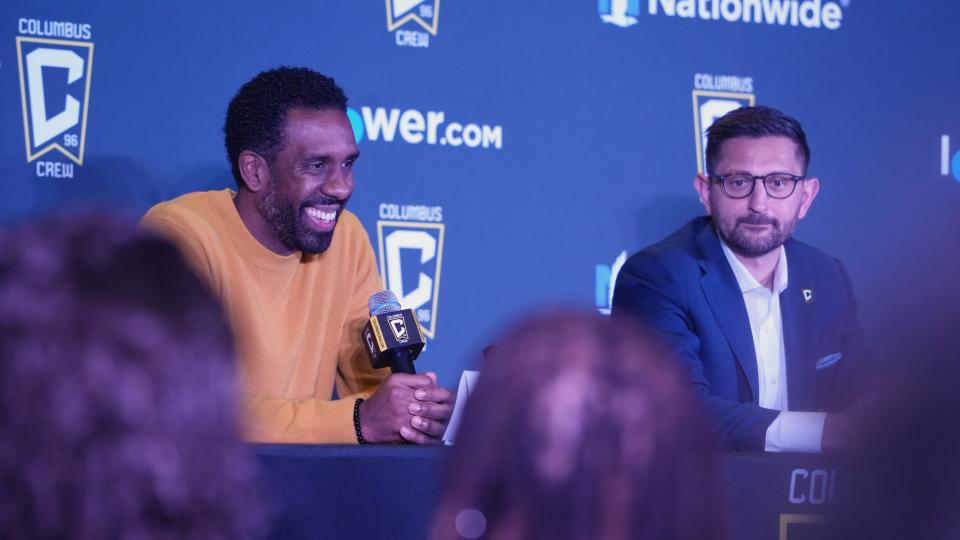
“We all came together,” Tall said. “It’s crazy.”
On Wednesday night, Nancy will coach the MLS team against a Liga MX side in the MLS All-Star Game at the new Crew Stadium. Nicholls and Tall, the Crew’s new GM, will probably be in a team suite. Bezbatchenko and his family will be somewhere – in a box or a club seat or in the stands – as pure fans. By the end of the month, Bezbatchenko will be leaving for England and his new job as president of Black Knight Soccer Club, which owns Bournemouth of the English Premier League and has stakes in teams that play in France, Scotland and Australia.
They will always be part of the first class of MLS personnel – Nancy and Nicholls as students, Bezbatchenko as an administrator of sorts and Tall as, well, an intern – to be exposed to the Elite Formation Coaching License program, an internationally renowned master class in teaching the game.
Columbus Crew: Thanks to Crew, Buckeyes, Columbus makes list of top-10 soccer-football cities | Oller
“It was a moment that changed all of our lives,” Bezbatchenko said. “I would say it was a turning point. If someone asked me when MLS started to change, it was when we saw that we needed to commit to player development, and it was going to come through education. Education. Learning at a deeper level. Stop trying to run through walls, like the national team. It was ‘Hey, let’s get out in the world and see how they’ve done it. And let’s actually learn.’ ”
MLS increases its commitment to academies
By the end of the first decade of the century, MLS decided that its commitment to academies – for talented players from U-12 through U-18 – would be critical to the future growth of the league, and perhaps to the growth of the game in the United States. To that end, Todd Durbin, the league’s executive VP, was dispatched to France in 2012. Why France? Because the country was gaining worldwide renown for its youth coaching.
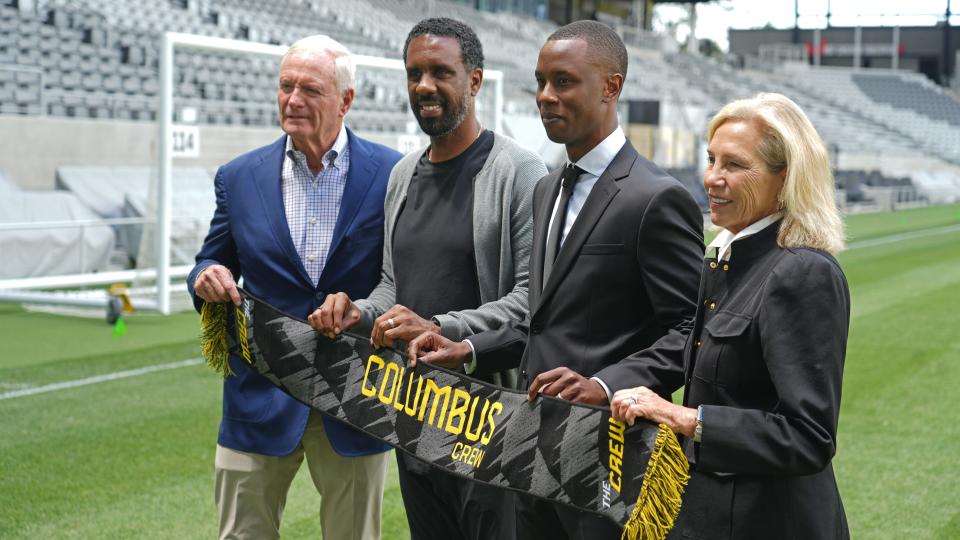
Durbin and Francois Blaquart, technical director for the French Football Federation, hatched an idea: A program to give MLS academy directors access to the Elite Formation Coaching License, as administered by the French federation and coordinated on the MLS side by Bezbatchenko.
Said Tall: “The league – and it was so smart from them – they looked at their player development and they said, ‘Wait a minute. Our players are just as good as any other teams’ when they’re 13-year-olds. But then when they’re 16, 17 years old, we get crushed by other teams. So, the issue is not talent in our country. It’s the coaches who don’t know how to develop our players. So, let’s look around and see who the best player developers in the world.’”
Each MLS club nominated one coach from their academy for the program.
“Those people who were in charge of player development at the time are now a who’s-who in the league,” Bezbatchenko said. He ticked off a few names – former San Jose Earthquakes coach Luchi Gonzalez, San Jose general manager Kris Leitch, Los Angeles Galaxy coach Greg Vanney, Seattle assistant Freddy Juarez – and added, “I could go on. It was quite a cast.”
Bezbatchenko was one of the MLS executives who oversaw the program, here and abroad.
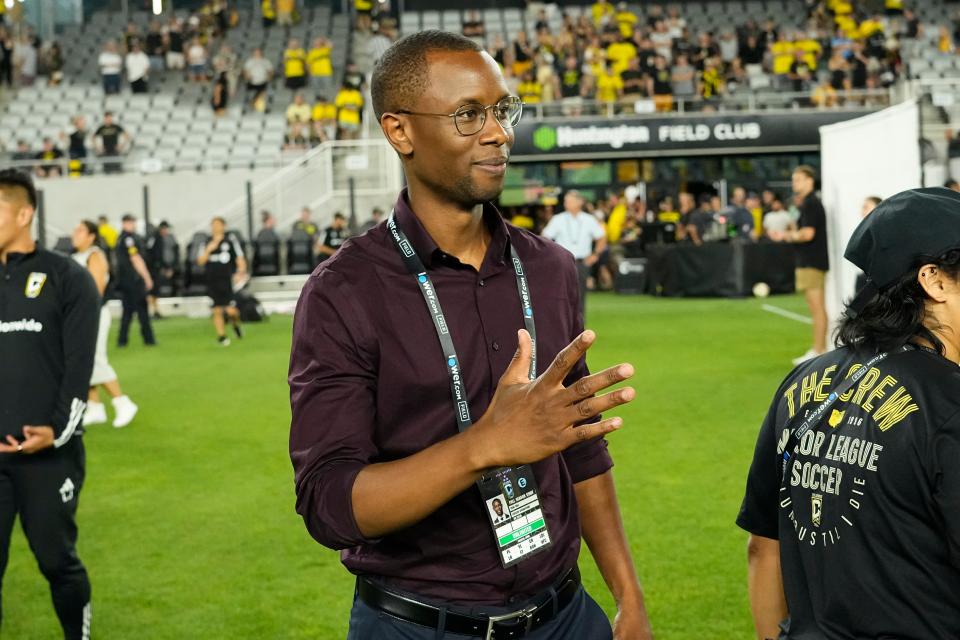
The program had three parts spread over 15 months: Eight weeks (320 hours) of field and classroom instruction; two weeks of immersion at an international youth academy at two European clubs (Paris St. Germain, Olympique Lyonnais, Real Madrid, Athletic Bilbao and VfB Stuttgart were the early participants); and, finally, integration and modification of the programs at MLS academies.
It began in February with a two-week session at the INF Clairefontaine (Institut national du football de Clairefontaine), home of France’s flagship academy and its national team. The chateau sits atop a rise and is surrounded by woods. Indoor and outdoor facilities are scattered among the clearings below. Those who were there remember the gentle snowfalls.
“I remember it as quite an idyllic setting for what was really a magnificent course and the best experience of my life," Nicholls said. "There was a lot of focus on those first two weeks on who you were as a person and this idea of knowing yourself. It was only then when you know yourself that you can grow, develop, thrive in other areas. It was quite exhaustive. We were definitely not on holiday.”
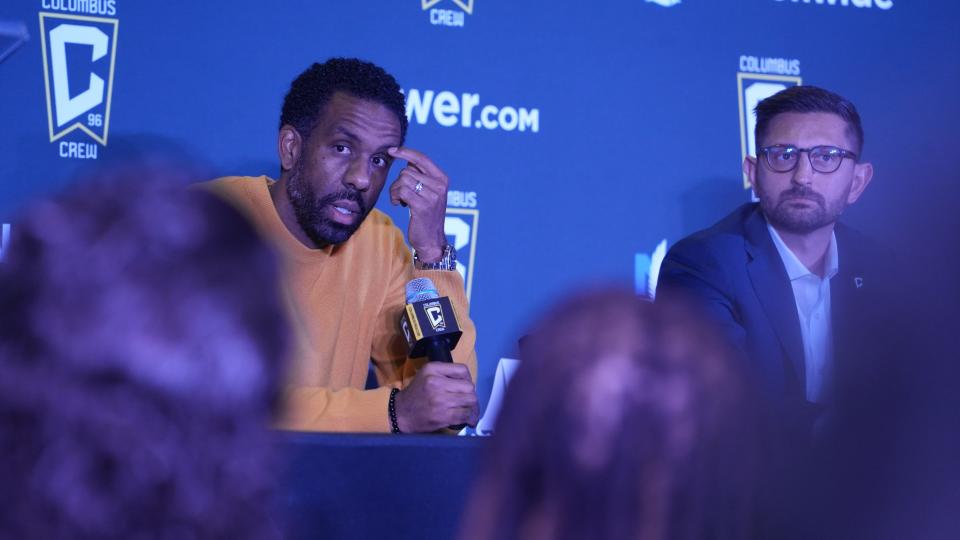
Said Nancy: “I was not supposed to go for this course because my technical director of the academy of Montreal was supposed to go, but he was being called up by the first team. So, I went instead of him.”
Bezbatchenko carried a suitcase full of curriculum materials home to the league office in New York. He dropped the bundle on the desk of a French-speaking intern, Tall, to be translated.
“I was still at school," Tall said. "I was working to 8 or 9 p.m. in New York City because I needed to finish these documents. And the next day I had to wake up early to go to school on Long Island. At the same time I was translating, I was learning all those methods. It’s not just soccer, per se, it has psychology in it, it has the physical part of the game in it. It was really enlightening and very rich.”
In June, Tall traveled to Denver for the second round of field and classroom work. He, Bezbatchenko, Nancy and Nicholls were together for the first time. The next time would be in 2022, when Nicholls left Charlotte to take the technical director’s job in Columbus. In 2023, they’d all lift the MLS Cup together.
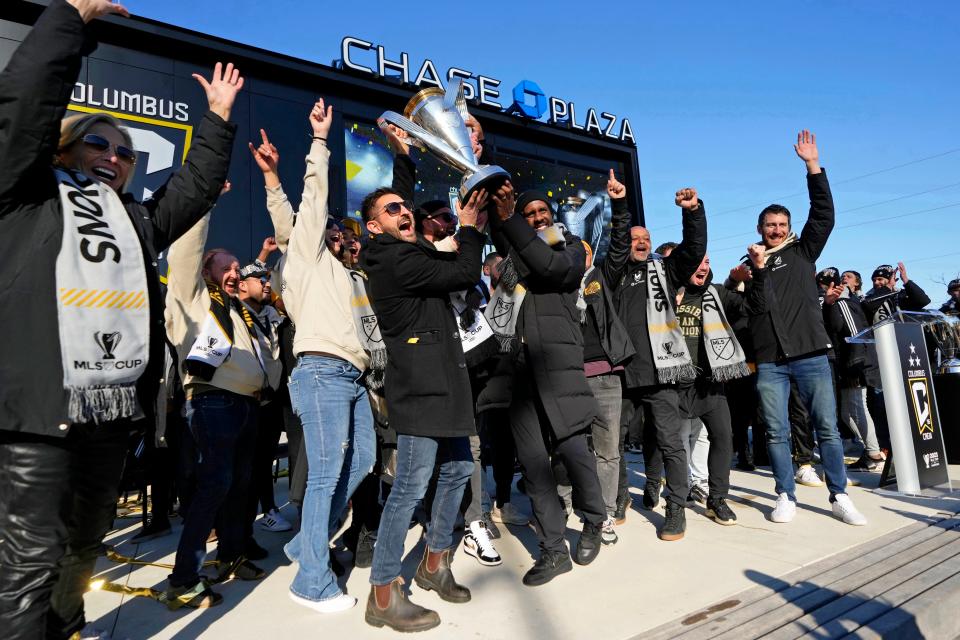
Serendipity.
“It’s in all of us," Tall said. "Every person that went to that course, I think it stayed with you. That first generation, we have a bond. We went through a lot in terms of learning, and it was humbling. Even for the French instructor, having to deal with another culture, it was humbling for him.”
Academy brought 'quite a bit of pressure' on coaches
After knowing thyself, the technical aspects of the game were covered. This part was detailed, and mastery was a requirement. If a coach can’t recognize every nuance of a game in real time, then he/she can’t begin to teach young players to recognize what was going on around them.
“It was pretty clear from the start that there was a degree of intensity, scrutiny, accountability and, as things developed, you were under quite a bit of pressure," Nicholls said. "You had to be vulnerable there with your peers. You were mic’d up. You were scrutinized with video following your training. There was group work that you presented. There was no hiding place.”
After mastery game came the hard part.
“They have a specific pedagogy, and it’s how you teach," Tall said. "They dissect the game into phases of the game and principles of plays. There were 21 defined principles of plays, and the way you structure your training session was based on one principle and one concept principle. Very detailed.
"But the big difference, honestly – and it sounds simple – but the big difference between the French way at the time and the American way is the French instructor told our American coaches: 'If the training session is not good, if the players are messing up, it’s on you. It’s not the players or their level. It’s your fault.’ That was the shift in people’s mindset.”
How does an 11-year-old brain work? An 18-year-old brain? What is the best way to reach them – without preaching to them?
Asked what remains with him all these years later, Nicholls said:
“I would say the self-awareness aspect. Your capacity to grow. Your strengths. The human aspect. We can talk all day about the Xs and Os, and the theory of education and teaching, but how you share your message, how you relate to others, how you inspire, how you adjust for individuals – while at the same time creating a collective ethos – is probably best explained by Columbus Crew, and how we play. Because I believe Wilfried has become a master at that.”
Columbus Crew coach Wilfried Nancy a resident master
Earlier this year, Nancy was asked about what he did with his championship team during the earliest days of his 2024 training camp.
"The first leg is about concept," Nancy said. "No structure. It’s all about no system. It’s all about cues. The second leg is going to be about the structure. If we build up, if we try to advance, how many (opposing) players are inside the box? Defensively, how do we defend at the line, and outside the box, and inside of the box? More instruction. … We’re able to get to the complex exercises already.
"Last year, it took three or four weeks. So, this is a big difference. This is good. The idea now is to give them more tools, with and without the ball.”
That gives one an idea how Nancy applies theory to tactics in training. He favors an aggressive, 3-4-2-1 formation, and its success is dependent on his players processing what is around them, recognizing what to do next and adjusting so they can go forward together. It is pure jazz, with a theme (score the ball) and a lot of improvisation (did that center back just make a diagonal run into the middle of the box?). The band needs to be tight to read where the music is going.
When Nicholls calls Nancy “a master,” it is because Nancy has found a formula to transition from pedagogy, the theory and practice of education, to andragogy, the theory and practice of education specifically for adults. It’s the concepts, the structure, or the non-structure, and the myriad details that are covered the training ground, the stadium pitch and in the locker rooms. Nancy comes down, or goes up, to his students' level.
“The goal is to make better players and better people,” he said.
Nicholls suggests that this ethos, once pixels in Nancy's life experience, might have come into sharper focus in 2013. That year, as part of the EFCL, the two immersed themselves in the Lyon academy.
“When you go on those trips there’s a bit more of an intimate bond that occurs and discussions that happen and you’re able to see the application of the course in reality," Nicholls said. "I actually looked at the presentation I did on Lyon the other day, I actually shared it with our staff, because I believe a lot of the fundamental ideas of what that club are shared with the Columbus Crew.”
Such as?
“Humility," Nicholls said. "A real sense of togetherness. You got a feeling when you walking into Lyon that there were no airs and graces. It was very … It felt natural. The interaction between people, they didn’t feel hierarchical. It felt open.”
The third phase of the EFCL course – integration and modification of the program to MLS academies – is useful as a metaphor. For Nancy, Tall, Nicholls and Bezbatchenko, it’s not too much of stretch to say their life’s work has been integration and modification of the course, and it continues yet.
Nancy, 47, the son of a French navy careerist, saw different parts of the world and became aware of different social strata at a young age. His philosophy and his tactics are amalgam of what he experienced as a lower-level professional in France, as a collegian at the University of Quebec and as a coach at every level of Montreal’s academy.
As Nancy told the Dispatch last year, “In the beginning, I was thinking, ‘You have to be like that.' No. You have to be yourself. For me, I’m happy because I am able to be myself when I coach. I am also able to be proud of what I do, knowing that I try to open my eyes on everything. (I research) the CEOs, the way they work. All the big personalities that started from nothing, and after that, they became good leaders.
"For me, this is really important. That’s why I shape my mind and I shape everything to be the person that I am today. It’s been a lot of research, but a lot of introspection for me also to know what kind of a person I am. For me, it was powerful. I am able to see now. I’m wiser. I’m more confident. I know exactly what I want.”
Tall, 36, has a background that is strikingly akin to Nancy’s – French-born son of African immigrants who went through the French academy system, played college soccer (at Adelphia) and worked his way up from league intern to MLS general manager. They have been close friends since they met in Denver in 2013.
“In many ways, Issa did go through the course," Nicholls said. "He was under this intense pressure, as we were. We would all be up until 2 a.m., finishing our assessment assignments. And Issa would be the same.
"When you talk about documents – I still have these documents – it’s a lot of power points! A lot of nuanced language. So Issa was probably an unsung hero of the course because he had to take not only the general language skills and apply them, but also the very nuanced language skills, and the translation of the game. He learned just as much as we did. We probably didn’t appreciate it at the time, but we owe him a debt of gratitude.”
Nicholls, a U.K. native, is a longtime coach and mentor who is renowned as an academy architect. A two-time U.S. Academy Coach of the Year, he has been rolling players from the youth ranks into the pros for more than 20 years.
They were brought together by Bezbatchenko, 42, who built a powerhouse in Toronto, returned home to rebuild the Crew and won his second and third MLS Cups in Columbus. He departs now for England, where he will adapt.
“Life," Nancy said. "I’m 47 years old. I didn’t know I’d be in Columbus working for Bez and Issa. With Marc. It has been amazing. Everything started there (at Clairefontaine), in terms of trying to see a different picture.”
What about the next generation of coaches?
Said Tall: "I think this year will conclude the fifth generation of coaches to go through the program. Approximately 125 coaches have gone through the course. All over the league, and in the lower leagues as well − the USL, at local clubs, and so on − and they are all implementing that way of coaching. It benefits the entire country."
Crew 2 won the inaugural MLS Next Pro Cup in 2022. In his first months on the job, Nancy took eight players from that Crew 2 team and graduated them to the senior team. Three of them − goalkeeper Patrick Schulte, wingback Mo Farsi and midfielder/defender Sean Zawadzki − played critical roles in the run to the MLS Cup championship.
Crew 2 made back to the MLS Next Pro Cup in 2023 with lineup that was virtually turned over and played a new system. Crew 2 coach Laurent Courtois, after his team lost to Austin in the championship game, said this:
"I was looking for a mentor for a while. I told the guys: I left home for soccer, I was 14 years old. For 30 years, I was looking for somebody that would inspire me in terms of top to bottom, from A to Z, as a coach. This is Wilfried Nancy.
"I've been coached by coaches in La Liga, in Ligue 1, in Premier League, and Wilfried is by far the best, whether it's by tactical content or management or improving people, not only individual. So, you check all the boxes of what you look for in a leader and he's by far way ahead. Watching him every day this year as been a blessing and I feel really, really grateful"
In January, Courtois was hired to coach CF Montreal's first team.
Know thyself. Know the game. Learn how to teach. Coach the whole person. The belief is that when these things are done right, what is created can be sustained, right here in the U.S. The academy system is now an MLS feature. In Columbus, it has its roots on the grounds of a French chateau 11 years ago, when Bezbatchenko, Nancy and Nicholls first met, soon to be joined by an intern.
Get more Columbus Crew news by listening to our podcasts
This article originally appeared on The Columbus Dispatch: Columbus Crew: How a 2013 France meeting led to current team success

